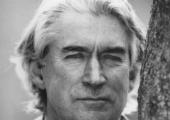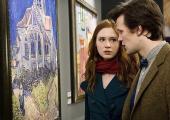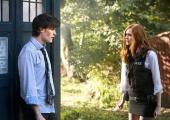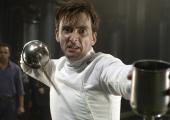Is there a televisual instruction manual for Nazi-era dramas? Cabaret singers with heavily kohled eyes, champagne from unmatched glasses in a shabby-chic apartment, smoke-filled gay bars in cellars with muscled trade, Stormtroopers marching in lockstep and Nazi banners unfurling from windows would all be on it. If there is, Christopher and His Kind last night was following it - but then it also wrote it.
Christopher Isherwood is responsible as much as anyone for our perceptions of the period, but after decades of cinematic and theatrical adornments and encounters in this mode, a production of Isherwood's memoir cannot help but seem hackneyed, a victim of its own style. Still, returning to the source (in Kevin Elyot's adaptation) at least allows us to understand that before the style there was a story.
The story, rather depressingly, is of a one-man universe, of the complete selfishness of Isherwood (Doctor Who's Matt Smith) amid decadence and disaster in Berlin. It is a wildly unsympathetic part: Isherwood cannot see the world beyond his penis. The film shows this very well, both in the vivid yet unerotic sex scenes (this film will be heaven for Doctor Who slash fiction fans) and in the whirling and unexpected camera angles, which replicate the novelty and horror of everything to Isherwood, who is unworldly - or uninterested.
Isherwood is politically uninterested, certainly - despite great chunks of exposition from other characters (your heart falls when you get another GCSE history class) and their urgent moral opinions, Isherwood fails to stir himself at the rise of the Nazis, and even seeing the Nazis beat up someone hardly motivates him. He checks out a Nazi at an adjacent urinal, for God's sake. A wealthy Jew challenges him about opting out from "the messy business of living" in favour of art.
It takes a bravura scene of book-burning for him to contemplate the "shame, shame" he mutters about: both the Nazis' and his own. The scene works so well because, although we often hear about it, the dragging of carts of books, the enthusiasm of the arsonists, the random pages of books thrown up into the night sky on the force of the fire are rarely as vivid to us. (Having Wilde and Mann's books on the pyre, licked by flames, was probably overdoing it.)
But even after this it seems that he is emotionless. He cannot understand how his boyfriend will not leave Berlin and his brother - Isherwood found it easy enough to leave his own brother with their shrewish mother. He wants to get his boyfriend out of Germany, but confesses to being slightly relieved when he is deported from England, facing an uncertain fate. Matt Smith is able to take on the unpleasantness, even the deadness, of his interior as Isherwood appears more of a monster, and every time his heart does not break, Smith manages to make him look almost sorry for it.
Imogen Poots plays Jean Ross, the inspiration for Sally Bowles, and when they meet in Knightsbridge before the war, she flashes him her copy of his book, glad that he has cannibalised her life, just like he has turned Toby Jones's preening queen into literary fodder. Like much of the rest of the film, and Isherwood confesses this at the start and towards the end, we are watching his memories, not fact, and only in his mind could Ross feel this way. Poots and Jones humiliate Smith in their emotional shading, but Smith never stood a chance by pouring himself into this chilling man, even though he does so convincingly.
Isherwood leaves, and not just Berlin - he goes to California. In a late scene in his Seventies Californian apartment, he confesses that he was isolated but says that he was helping the cause of gay rights without realising it at the time (by screwing a series of models from Vogue tableaux, according to this film). In his political, financial, social, sexual safety, this comes across as base self-justification a million years and a million miles after he fled. I suspect the director wants us to have some sympathy for Isherwood, with a touching shot of a meaningful Berlin-era clock, but after this film, sympathy is denied to the man who denied sympathy to all others.






